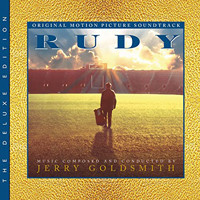While famed for his science fiction music, his horror music, his action music – well, basically all his music – there’s no doubt that the sort of film Jerry Goldsmith most enjoyed scoring was none of the above. Particularly later in his career, he loved doing films about people – and having the chance in his music to find a way of getting inside those people. It’s no coincidence that for years he said Islands in the Stream was his own favourite score – until he did Rudy, after which he always said it was this one.
David Anspaugh’s lovely film about Rudy Ruettiger, told he was too short to play American football – but try and try he did, and eventually of course he got to live his dream – is a great sports movie. (He previously directed probably the greatest sports movie of all, Hoosiers, which also featured a brilliant Goldsmith score.) For non-Americans you do have to squirm through every last time “Notre Dame” is pronounced, but otherwise it’s a treat.

It wasn’t a great success though, at least not initially, so outside of the usual crowd Goldsmith’s score didn’t seem to take off the way it would have done had the film been more widely-seen – until fairly recently where it does seem to have taken on a bit of a life of its own. It’s no surprise – it’s blessed with one of his sweetest main themes, one that sticks in the mind forever, and a barnstorming theme for the football itself.
That main theme – loosely based on the Irish folk song “The Last Rose of Summer” (YouTube it) – is a stunner. Opening with a flute solo providing a celtic lilt before the orchestra swells as it goes – and even, still comparatively rare for Goldsmith at the time, gets a choir thrown in, cooing away wordlessly – it’s a stone-cold classic, evocative and emotional and moving. The composer throws it through so many variations during the score – you’d better like it, because you’ll hear an awful lot of it – mind you, if you don’t like it then you probably have bigger worries in your life.
In “A Start”, Goldsmith plays with the theme again before late in the cue he gives us the first glimpse of the score’s second theme. That one is just as malleable and used almost as often – there are two parts to it, one in which a four-note phrase is stated, repeated and then slightly varied – essentially over and over again, – and the other, more famous one, where he takes the first two of those notes and launches off into a longer-lined melody. It really gets going in the glorious “Tryouts”. The famous finale “The Final Game” is where everything comes together, both themes in harmony, the emotion ratcheted up as far as it goes – it’s awe-inspiring, a master film composer doing his job better than anyone else has ever done it. No wonder the Hollywood musicians stood up and gave the composer a standing ovation after they played the piece for the first time (a tradition that then endured for the rest of his peerless career).
In truth, Rudy is a very simple score. It is feel-good and warm from start to finish, and virtually the whole thing is based on one or other of those two themes (there is a third theme, used much less frequently, which is often heard as an introduction to one of the others – expressed most clearly in “Empty Stadium” – and the occasional passage of other material). Sometimes simple is exactly what is required, and that’s very much the case here.
Jerry Goldsmith is a rare exception for me where I often find great value in extended versions of his scores – while he was brilliant at making an album hang together, his music is generally so good and so interesting that it can sustain complete releases – I was a little sceptical that Rudy would fall into this category, given how repetitive the score is. The original 36-minute album was perfect, but it’s hard to complain about anything that’s been added here. The sound is perhaps slightly upgraded, but not enough that I would notice unless doing an A-B comparison for the purposes of writing on the internet about it (and the legendary “la-la-la” interloper in the main theme is still there, happily ). If you take out the source music (which you must) and the bonus cues at the end then you’re still under an hour, and you can spend that hour just luxuriating in some of the most overwhelmingly pleasant film music you could ever hear. This composer wrote fiendishly complex music in an extraordinarily accessible way – perhaps that was his great gift – Rudy is the score that most clearly demonstrates that when he wanted to go the other way, there was nobody around (at least in Hollywood) who could touch him at that, either. We were very lucky to have him. “The Final Game” just finished playing – excuse me, I have to go, I think I have something in my eye.












It‘s quiet in here! Why not leave a response?